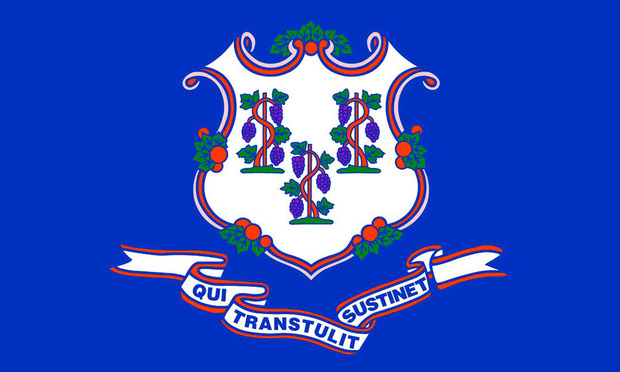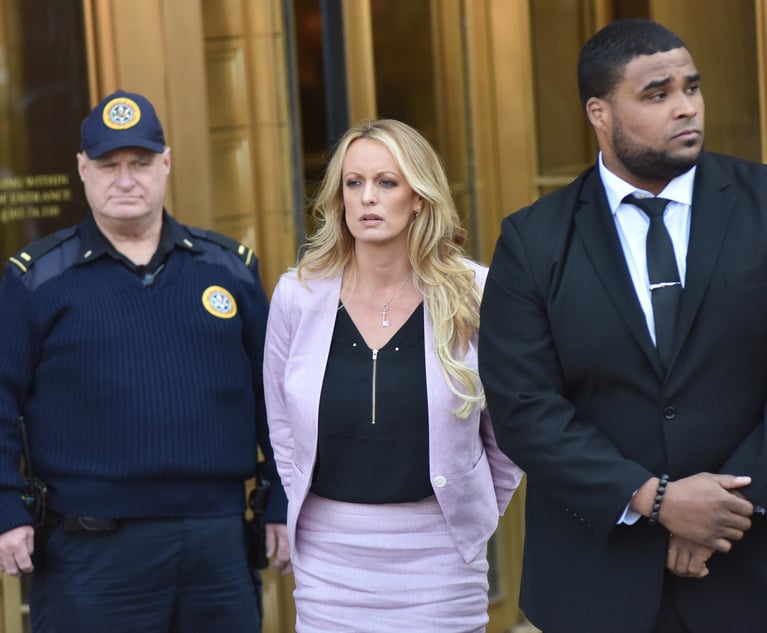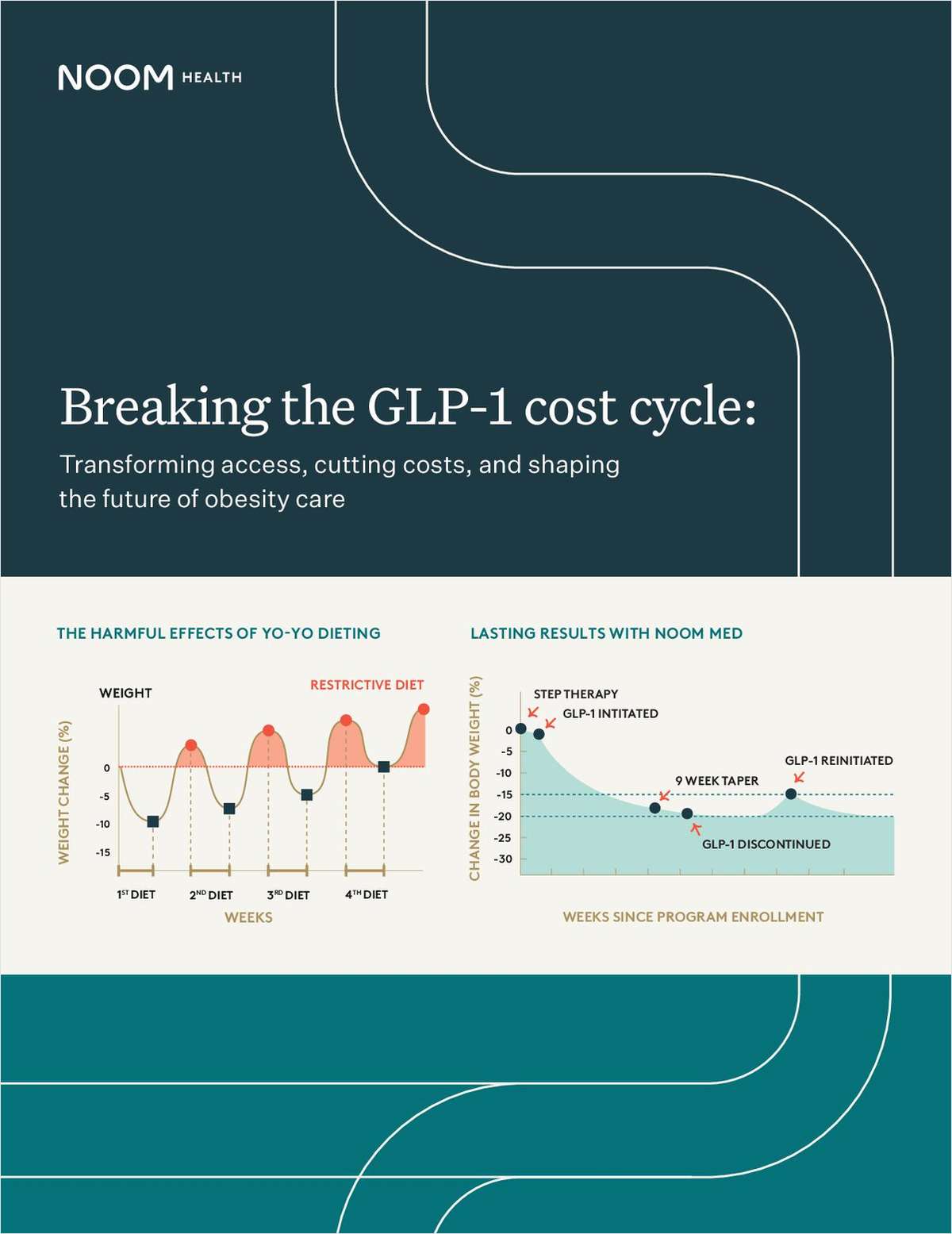State Legislature Finally Passes Revised Uniform Arbitration Act
With the increasing use of arbitration as a means of resolving disputes throughout the state and at the federal level, this is a positive step toward revising and modernizing arbitration procedures.
May 15, 2018 at 12:52 PM
4 minute read
 The Connecticut state flag
The Connecticut state flag On May 9, the Connecticut legislature unanimously passed into law the Revised Uniform Arbitration Act (RUAA). With the increasing use of arbitration as a means of resolving disputes throughout the state and at the federal level, this is a positive step toward revising and modernizing arbitration procedures.
Historically, Connecticut was one of the first colonies to adopt an arbitration act. That act, dating back to 1753, was titled “An Act for the More Easy and Effective Finishing of Controversies by the Use of Arbitration.” As the use of arbitration grew nationally, the National Conference of Commissioners on Uniform State Laws first promulgated a Uniform Arbitration Act in 1956. In response to ever-increasing popularity of arbitration in virtually all states, the commissioners enacted the Revised Uniform Arbitration Act (RUAA) in 2000. Prior to 2018, 19 states had adopted the RUAA—but Connecticut did not.
In the years since the RUAA was first adopted, several Connecticut lawyers have persisted in urging the legislature to join the growing number of participating states. In addition, the CBA's legislative lobbyist also played an active role. They all deserve credit for their perseverance and persistence. Likewise, the co-chairman of the Judiciary Committee, William Tong, and vice chairman Steve Stafstrom, deserve to be acknowledged for their efforts and support.
Overall, the enactment of the RUAA in Connecticut renders the arbitration process much more uniform. Several noteworthy features of the act include: a provision for enforcement of agreements to arbitrate that appear in electronic documents; a provision whereby a party may apply to a court for interim relief without automatically waiving the right to arbitrate; a new obligation upon arbitrators to disclose facts that might call the arbitrator's impartiality into question; a requirement that the arbitrator must conduct the proceedings in a fair and expeditious manner; and a specific provision that allows an arbitrator to clarify or correct an award.
One aspect of the RUAA that was not included in Connecticut's version of the law is the provision in the RUAA related to the payment of attorney fees in post-arbitration proceedings. Those proceedings include, for example, applications to vacate or to confirm the arbitrator's award. Although the RUAA provides that a judge may award attorney fees to the prevailing party in such proceedings, Connecticut's version of the act does not include this provision. The main reason for this change was based on a longstanding law in Connecticut that states parties normally should pay their own attorney fees.
This move toward uniformity of procedures in alternative dispute resolution such as arbitration has very real value for practicing lawyers. Uniformity is particularly important for those practitioners who may not be thoroughly familiar with the nuances of the arbitration process. Although a seasoned practitioner over time will undoubtedly become aware of many of the particulars related to the arbitration process, there are subtle procedural rules that can cause serious problems for the uninitiated. For example, the timing and filing deadlines for applying to the court to vacate an arbitration award is a matter of subject matter jurisdiction. Accordingly, if such an application is not filed within the prescribed time limit, the court will dismiss an application to vacate based on lack of subject matter jurisdiction. This issue can be further complicated in the event that an arbitrator has rendered a corrected award. In at least one Connecticut case, the court dismissed an application to vacate an arbitration award in which the arbitrator had made minor corrections to the award and the filing party waited until after the corrected award was issued. With the enactment of this uniform law addressing an arbitrator's ability to modify or correct an award, presumably such issues will not be as difficult to resolve.
The RUAA in Connecticut is set to take effect Oct. 1. While Connecticut General Statutes Section 909 (governing arbitration) remains in effect as law and will apply in certain instances, the RUAA will apply to arbitration agreements entered into after Oct. 1. We applaud the legislature's move toward uniformity of arbitration procedures in Connecticut.
This content has been archived. It is available through our partners, LexisNexis® and Bloomberg Law.
To view this content, please continue to their sites.
Not a Lexis Subscriber?
Subscribe Now
Not a Bloomberg Law Subscriber?
Subscribe Now
NOT FOR REPRINT
© 2025 ALM Global, LLC, All Rights Reserved. Request academic re-use from www.copyright.com. All other uses, submit a request to [email protected]. For more information visit Asset & Logo Licensing.
You Might Like
View All
The Stormy Daniels 'Hush Money' Trial: Donald Trump Should Be Very Worried
7 minute read
Shining a Light on Opposing Hate: The Palestinian Protesters Who Defended New Haven's Menorah
6 minute readTrending Stories
- 1Spotify GC Steps Down, Opts to 'Step Away from Full-Time Corporate Life'
- 2Coming This Year: Statewide Case Management System
- 3Adding 'Credibility' to the Pitch: The Cross-Selling Work After Mergers, Office Openings
- 4Low-Speed Electric Scooters and PIP, Not Perfect Together
- 5Key Updates for Annual Reports on Form 10-K for Public Companies
Who Got The Work
J. Brugh Lower of Gibbons has entered an appearance for industrial equipment supplier Devco Corporation in a pending trademark infringement lawsuit. The suit, accusing the defendant of selling knock-off Graco products, was filed Dec. 18 in New Jersey District Court by Rivkin Radler on behalf of Graco Inc. and Graco Minnesota. The case, assigned to U.S. District Judge Zahid N. Quraishi, is 3:24-cv-11294, Graco Inc. et al v. Devco Corporation.
Who Got The Work
Rebecca Maller-Stein and Kent A. Yalowitz of Arnold & Porter Kaye Scholer have entered their appearances for Hanaco Venture Capital and its executives, Lior Prosor and David Frankel, in a pending securities lawsuit. The action, filed on Dec. 24 in New York Southern District Court by Zell, Aron & Co. on behalf of Goldeneye Advisors, accuses the defendants of negligently and fraudulently managing the plaintiff's $1 million investment. The case, assigned to U.S. District Judge Vernon S. Broderick, is 1:24-cv-09918, Goldeneye Advisors, LLC v. Hanaco Venture Capital, Ltd. et al.
Who Got The Work
Attorneys from A&O Shearman has stepped in as defense counsel for Toronto-Dominion Bank and other defendants in a pending securities class action. The suit, filed Dec. 11 in New York Southern District Court by Bleichmar Fonti & Auld, accuses the defendants of concealing the bank's 'pervasive' deficiencies in regards to its compliance with the Bank Secrecy Act and the quality of its anti-money laundering controls. The case, assigned to U.S. District Judge Arun Subramanian, is 1:24-cv-09445, Gonzalez v. The Toronto-Dominion Bank et al.
Who Got The Work
Crown Castle International, a Pennsylvania company providing shared communications infrastructure, has turned to Luke D. Wolf of Gordon Rees Scully Mansukhani to fend off a pending breach-of-contract lawsuit. The court action, filed Nov. 25 in Michigan Eastern District Court by Hooper Hathaway PC on behalf of The Town Residences LLC, accuses Crown Castle of failing to transfer approximately $30,000 in utility payments from T-Mobile in breach of a roof-top lease and assignment agreement. The case, assigned to U.S. District Judge Susan K. Declercq, is 2:24-cv-13131, The Town Residences LLC v. T-Mobile US, Inc. et al.
Who Got The Work
Wilfred P. Coronato and Daniel M. Schwartz of McCarter & English have stepped in as defense counsel to Electrolux Home Products Inc. in a pending product liability lawsuit. The court action, filed Nov. 26 in New York Eastern District Court by Poulos Lopiccolo PC and Nagel Rice LLP on behalf of David Stern, alleges that the defendant's refrigerators’ drawers and shelving repeatedly break and fall apart within months after purchase. The case, assigned to U.S. District Judge Joan M. Azrack, is 2:24-cv-08204, Stern v. Electrolux Home Products, Inc.
Featured Firms
Law Offices of Gary Martin Hays & Associates, P.C.
(470) 294-1674
Law Offices of Mark E. Salomone
(857) 444-6468
Smith & Hassler
(713) 739-1250












